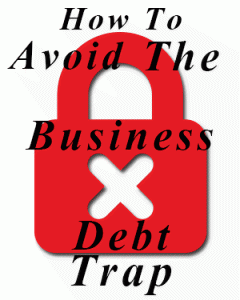To avoid the Business Debt Trap when starting, it is often recommended to start with the minimum viable product. This gives the entrepreneur a chance to prove the concept and justify further additions of capital of either personal savings or borrowed funds.
If the proof of concept works, the business owner can then gradually increase funding to the business at a rate comfortable to the business without burning out.
 The reason caution is encouraged, is because a business has several priorities which must be met at fixed specific intervals i.e. marketing, payroll, rent, bills, taxes, legal licenses and a few others. They come at regular intervals and are very damaging if not paid on time.
The reason caution is encouraged, is because a business has several priorities which must be met at fixed specific intervals i.e. marketing, payroll, rent, bills, taxes, legal licenses and a few others. They come at regular intervals and are very damaging if not paid on time.
The skill that the business owner really needs to master is the art of prioritizing. Given a set of needs by the business, the business owner must know which ones are critical and which ones can be down scaled in the short term and upgraded later and those that must be taken care of now. Lack of priorities hinders strategies and intentions to avoid the Business Debt Trap.
So how can startups avoid the Business debt trap?
1. Buy the minimum viable assets
If you have an option between functionality and brand name, go for functionality without compromising the quality. When you want to avoid the business debt trap, good is good enough.
2. Pay only the most critical set up costs
If you have a choice between regional license and a local license, choose the cheaper local one and earn the larger one over time. Start with a smaller office and upgrade later.
3. Have at least 6 months of expenses upfront
I know you probably have better projections than what this point implies, but reality is more ruthless, have up to a year worth of expense money if you can raise it. Avoid the business debt trap by having expenses that are easy to pay.
4. The largest shares of capital go to the product and marketing
If it is not your product and it does not get customers to come through the door, consider eliminating it.
5. Avoid ego decisions by bouncing your ideas off others
Don’t buy things that make you look good like better suits, gold embossed business cards, ivory stationery paper etc. this are earned over time and are the destination prizes. Consult for opinions. If you seriously want to avoid the business debt trap you have to consider ego a cancer to be burnt out of your personality.
6. Get a useful and equal partner
Don’t partner with others just because you like them or they are your friends, get someone who has the same passion and investment capacity as yourself. This gives you accountability and perspective when you forget. They also compliment your efforts.
7. Do everything yourself or as much as you can yourself
This is not the time to indulge in expensive services like special mail deliveries or hiring petty errands for assistance in delivering things you can deliver yourself, do everything except what would brake you yourself, and save a ton of costs in the process.
8. Know when to quit
If it is not working, it is not working. Of course you need a bit of time to ensure your message gets to the customer and they are adopting to your product or service but if they are not coming in and they are openly telling you they don’t need your product, they don’t need it.
To effectively avoid the business debt trap by walking away from a, not so good, deal, the ego cannot be your friend.
Many of today’s business experts advice not to quit too early but don’t tell you how. I believe the better advice is to go into business prepared and willing to work your butt off and using common sense, budgets, advice from professionals and friend and avoiding ego trips and ultimately to Avoid the business Debt Trap overtly.
If you know what to do and have a minimum viable budget, embark in your business and scale slowly or as fast as your specific business will allow without braking yourself. Don’t buy or invest in products, people, expenses, assets and outflows that you don’t need right now.
So what happens if you have Shs100,000 and your minimum budget only requires Shs20,000 are you safe from the business debt trap?
Yes, if, you don’t spend the other Shs80,000 on anything, instead put it in a fixed deposit account or if you are disciplined enough, leave it in an account you will not access until you are ready for your next step this way, you outsmart and avoid the business debt trap.
